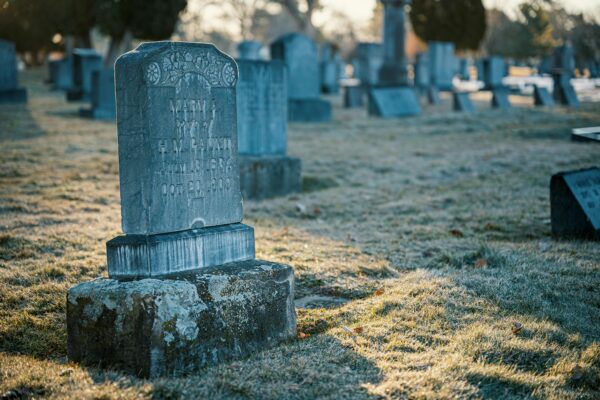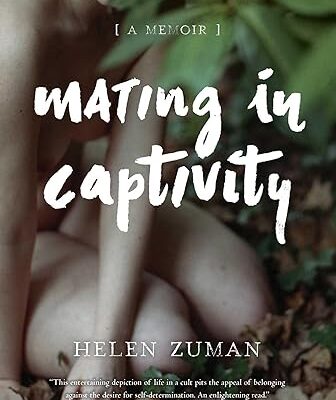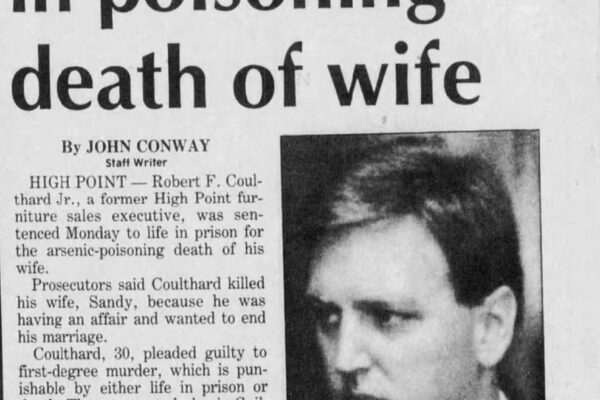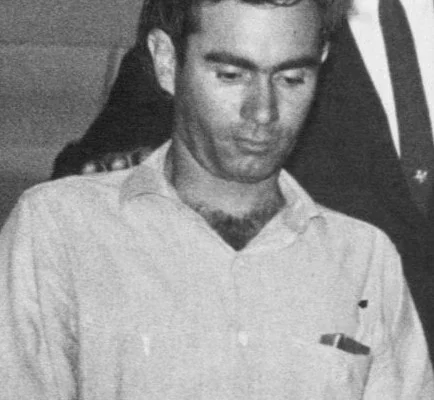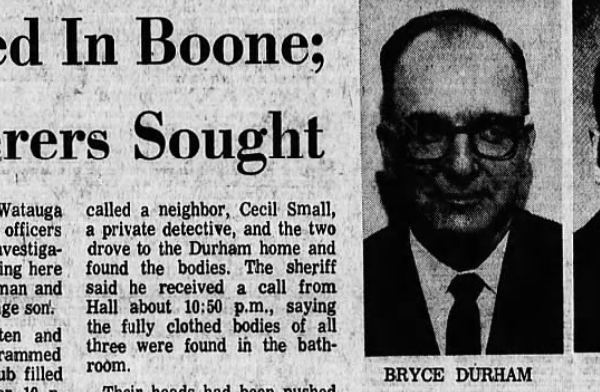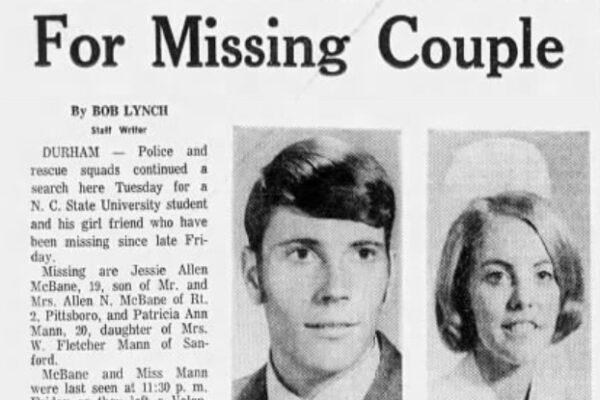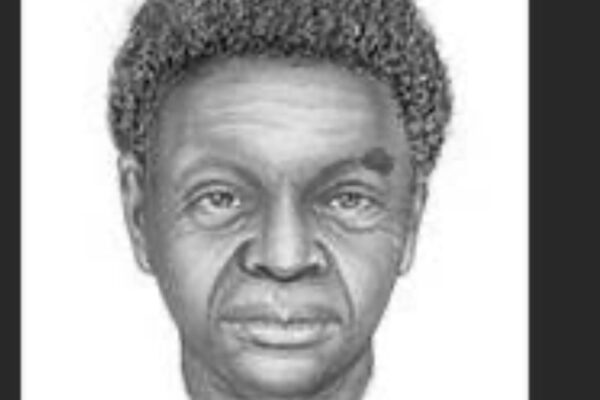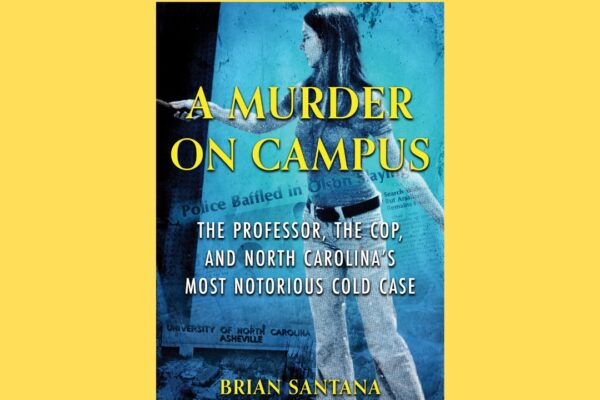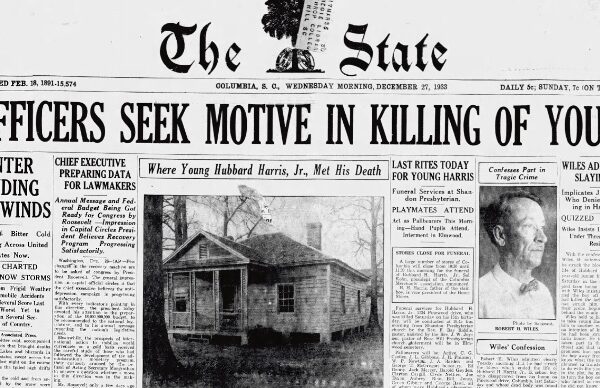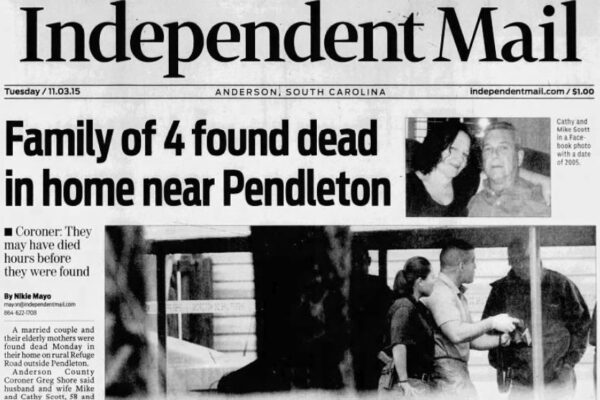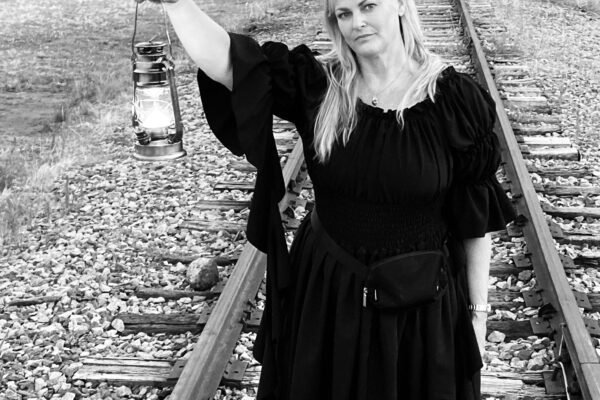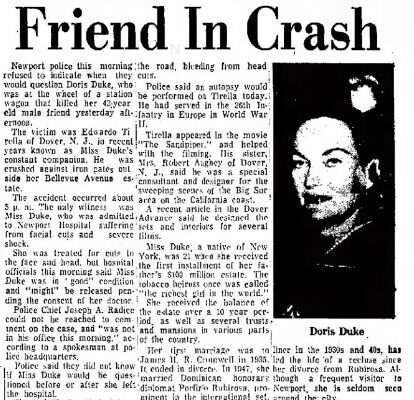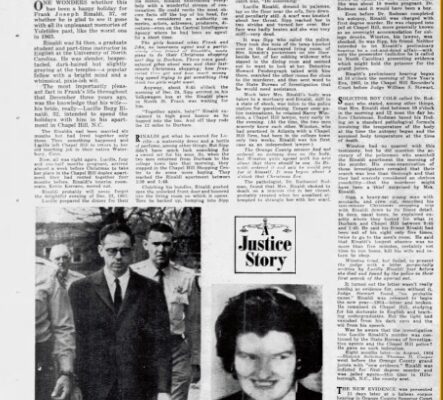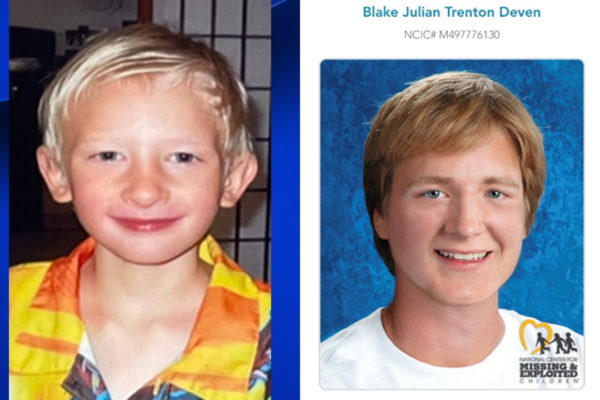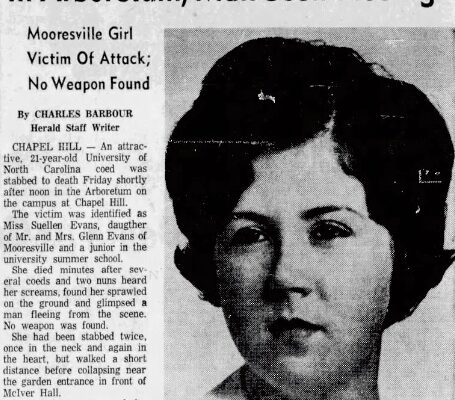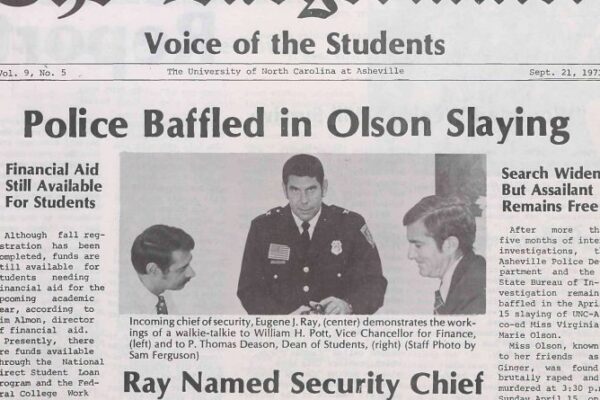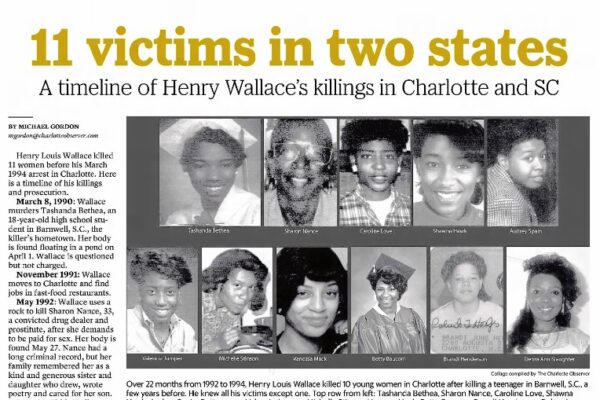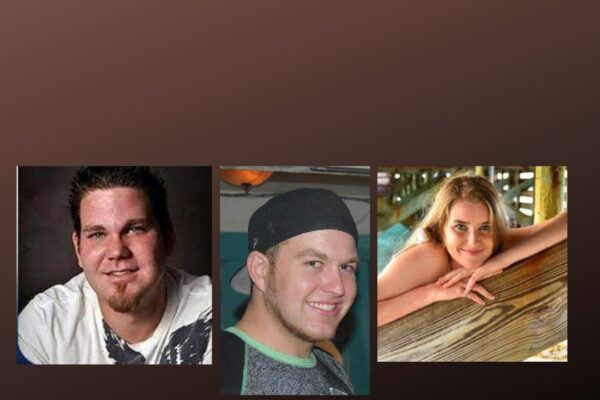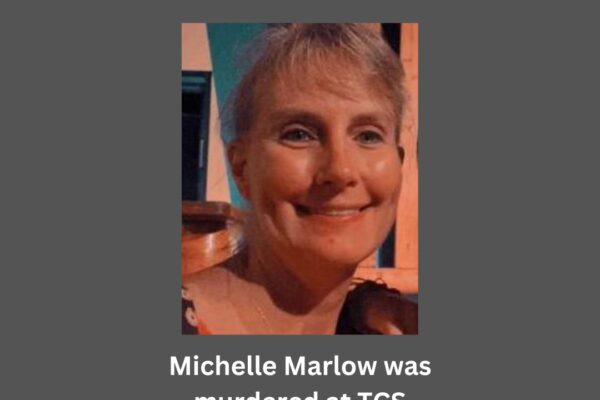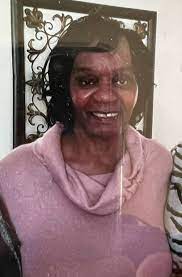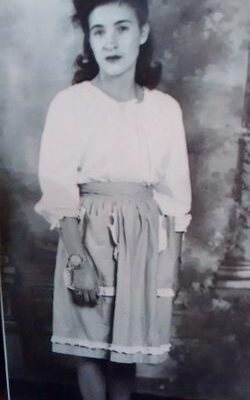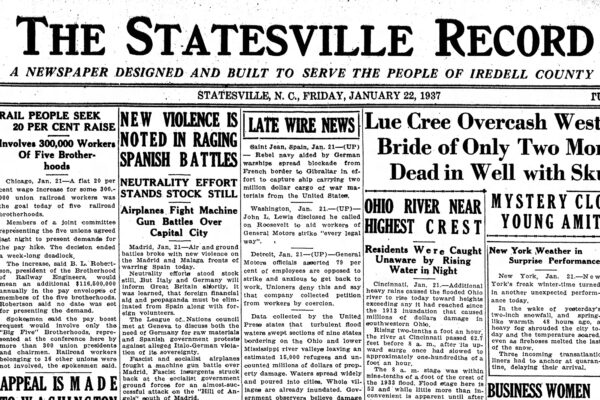On the morning of July 15, 1993, 26-year-old Chapel Hill resident Kristin Lodge-Miller left her apartment for her daily run. Kristin was an avid runner who kept a log of her routes and times in a journal at home. She lived in a residential neighborhood but was still apprehensive about jogging alone, so her husband bought her a can of Mace for her keychain. Around 6 a.m., a young man accosted her as she jogged down a local running trail on Estes Drive. Kristin had time to spray him with her Mace and tried to get away from him. He chased her, in front of several witnesses driving to work, about 1200 feet before shooting her in the back. He shot her multiple times with a .32-caliber handgun, before standing over her body and firing one final shot into the back of her head as she lay bleeding on the ground. She was murdered left than a half-mile from the police station. The suspect fled the scene on a bicycle.

Kristin was born in Iowa City, Iowa, and attended the University of Iowa, earning a degree in speech-language pathology. After meeting Erik Miller, the man she would eventually marry, she went back to her hometown and the University of Iowa to earn a master’s degree. She and Erik, who’d been married for four years, moved to Chapel in 1992 so he could enroll at the University of North Carolina for graduate school. She found a job as a speech therapist. He left for a summer internship in San Diego, California in June of 1993 and Kristin had visited him in early July, just a few weeks before her murder.
A Suspect Quickly Arrested
Police quickly arrested 18-year-old Anthony Georg Simpson and charged him with murder and attempted rape. According to the News and Observer, Simpson had moved to Chapel Hill from Norfolk, Virginia eight months earlier. He had attended Chapel Hill High School but quickly fell behind in his subjects. He’d dropped out of a summer school course for English. He was living with his mother, Karen Simpson, in a condominium in an upscale community. The media reported that Ethan Horton, a former UNC football player, owned the condo. When the murder occurred, Anthony’s mom was out of town, and he was staying at home alone.
Four people who witnessed the shooting were able to describe the assailant, and a police officer heading into work when the call about the murder went out was in the right place at the right time. He found Simpson hiding between two air conditioner units at the Church of Reconciliation on Elliot Road a short time later, less than a mile from where the murder occurred. The young man eventually led police to an abandoned shed off Estes Drive where he had discarded the murder weapon. His fingerprints matched those found on the ammunition clip in the gun.
Simpson’s teen years had been full of conflict. In 1992, he was charged with assault, and a few months later, was arrested on charges of stealing a car. After moving to Chapel Hill, Simpson was once again caught stealing a car with another juvenile acquaintance of his. They drove for 200 miles before being stopped by the police. The week prior to Kristin’s murder, a judge had opted not to sentence Simpson to jail time for the car theft, instead, assigning him community service.
When officers from the Chapel Hill Police Department initially questioned Simpson, they said he was arrogant and cocky. He declined to call his mother, saying he could take care of himself.
Orange County District Attorney Carl Fox, who was involved in last week’s episode about the murders of Curtis Bane and Thad Hayes, prepared to take Kristin Lodge-Miller’s murder case to trial. He told news outlets he would prosecute the case as first-degree murder and first-degree attempted rape as a death penalty case and wasn’t willing to accept any plea bargains. James Williams, a public defender with Orange County, had taken on Anthony Simpson’s case.
Kristin’s murder was the topic of many Op Eds that ran in the local newspapers at the time. As columnist John Bare wrote in the July 26, 1993 edition of The Chapel Hill Herald, “As difficult as it is to see past the emotional aspects of the crime, it’s important to understand the events that provided Simpson with the opportunity to prey upon a defenseless woman.”
Why Wasn’t Simpson Already Behind Bars?
Bare pointed out that Simpson had been granted a deferred prosecution, which is an option prosecutors can give people charged with crimes a second chance. Defendants can express interest in deferred prosecution, which means their court case will be postponed, usually for a few months, and prosecutors agree to dismiss the original charges if the defendant holds up their end of the arrangement. One week before Kristin was murdered, Simpson was granted a deferred prosecution in the charges of the car theft, even though he’d also been arrested in Virginia on similar charges. He’d agreed to perform community service as part of his agreement, but before he’d completed one hour of that community service, he committed murder.
Bare expressed that it’s difficult to know which defendants will do well with deferred prosecution terms and which won’t. He wrote:
“Prosecutors cannot be expected to be prescient enough to know which of the criminals who are granted deferred prosecutions will use the second chance to turn their lives around and which ones will sneer at the court system and keep committing crimes. But when a teenage summer school dropout with prior criminal arrests is charged with stealing a car, a red flag ought to go up in any district attorney’s office.”
Anthony Simpson’s trial began in Hillsborough in early May of 1994, less than a. year after Kristin’s murder. It lasted nine days, and the jury, comprised of nine women and three men, spent 11 hours deliberating Simpson’s fate. At one point, the jury was nearly deadlocked. The members had the opportunity to find Simpson guilty of several different crimes; first-degree premeditated murder, first-degree felony murder, and first-degree attempted rape. During the course of the trial, Simpson’s defense team didn’t deny that he had murdered Kristin, but they argued that the state’s case about the attempted rape was speculative.
The assistant public defender for Orange and Chatham counties, Robert Trenkle, said there was reasonable doubt in whether Simpson was planning to sexually assault Kristin. He asked the jurors to consider a second-degree murder conviction, saying his client shot Kristin in a “fit of rage” when she sprayed him with the Mace she carried on her keychain. District Attorney Carl Fox pointed to the fact that Simpson was armed with a gun when he grabbed her off the trail as a direct indicator of his plans to commit rape.
Members of the jury later told the media they did not believe Simpson murdered Kristin as a result of a failed sexual assault. They thought he likely snapped after being sprayed with the mace as Kristin defended herself.
A Controversial Verdict
When the jury returned their verdict, the community was divided on whether justice was served. Anthony Georg Simpson was convicted of second-degree murder. The jury found reasonable doubt with the attempted rape charge and cleared the young man of it.
According to the book, “North Carolina Crimes: A Guidebook on the Elements of Crime,” First degree murder is defined as a person killing another human being with malice and a specific intent to kill formed after premeditation and deliberation, or by poisoning, lying in wait, imprisonment, starvation, or torture or while committing or attempting arson, rape, or a sex offense, robbery, burglary, kidnapping, or any felony in which a deadly weapon is used.
Second-degree murder is when a person kills another human being with malice. Because malice can be inferred from the intentional use if a deadly weapon to inflict harm, the offense of second-degree murder can be established by showing a voluntary unlawful killing committed with a deadly weapon.
During the sentencing phase of the trial, Simpson’s mother, Karen, took the stand to testify for the defense. She told the jury her son had witnessed acts of domestic abuse during his childhood, along with estrangement and broken promises from his biological father. She admitted the gun used in the murder belonged to a relative and her son had taken it from their condo. On her way back from the stand, she could be seen stopping to grasp the hands of Kristin’s mother, and whispering the words, “I’m sorry.” Anthony Simpson told Judge Gordon Battle, “Judge, I know I’ve committed a bad crime. I’ll take any punishment you give me.”
The judge sentenced him to the maximum allowed for a second-degree murder charge, life in prison, with the possibility of parole after 10 years. That meant Anthony could have become eligible for parole at the same age Kristin Lodge-Miller was when she was murdered.
The Community Responds
In the days following the verdict, the opinion pages were filled with letters from community members, all voicing a variety of opinions. Some accused the jurors of being influenced by “racist activists.” Others pointed out that although Anthony Simpson was a young, black, male, he technically fell into the middle-class income level and could not lean on the economically-disadvantaged defense. Others wondered why a man who admitted to committing a cold-blooded murder was let off with such a light sentence. A spokesperson at the Orange County Rape Crisis Center said they had been flooded with calls, sparked by outrage that members of the jury failed to find that Anthony acted deliberately and with premeditation when he shot Kristin.
The executive director of the center, Margaret Henderson, told The Chapel Hill Herald, “The message this verdict sends out is if a woman defends herself, she provides a mitigating circumstance for her attacker; it has the ultimate effect of minimizing the importance of violence against women.” Kathleen Hopwood, who at the time co-owned a local Triangle business that taught women self defense skills, said, “What brought this 18-year-old boy out at 5 o’clock in the morning, on a bike, with a gun? He’s a predator. This verdict says, “It’s OK to murder women. For me it says, You’d better, learn to defend yourself, because if you don’t, your family’s not even going to have any justice.”
Eve Carson

On March 5, 2008, another young woman from Chapel Hill was murdered and for long-time residents, the shock of the crime and innocence of the victim couldn’t help but remind them of Kristin’s murder back in 1993.
Eve Marie Carson was a 22-year-old senior at the University of North Carolina majoring in political science and biology. She hailed from Athens, Georgia, where she excelled both academically and in sports. An article that ran in The News and Observer in the days following her murder highlighted her many accomplishments. She was a competitive soccer player and graduated from Clark Central High School as the class president and valedictorian. She won a Morehead-Cain Scholarship at UNC, which covers the full cost of four years at the university along with a stipend for summer enrichment activities. She continued pursuing her love of learning and giving back to others by serving as a mentor to local Chapel Hill and Durham schools and volunteering during her summers at places like Ecuador, Egypt, and Ghana.
A member of the Phi Beta Kappa honor society, she ran for UNC’s Student Body President during the spring of her junior year and won with 55 percent of the vote. In her role, she served as a member of the Board of Trustees, deciding how student fees were spent at the university, and advocating for lower tuition rates.
She served on numerous committees, coached a running program for girls ages 8 to 132and encouraged her fellow Morehead scholars to get engaged in a variety of projects. The Executive Director of the Morehead-Cain Foundation at the time said, “You were motivated to do something in the world if you were around Eve.”
Eve Carson, like Kristin Lodge-Miller before her, could have been any one of us. She was simply living the life of a busy college student in the early morning hours of March 5, 2008. That week had been full of activities for Eve—she attended a fan appreciation event sponsored by Nike, where she received a special pair of Carolina blue shoes, and attended the UNC-Florida State basketball game at the Dean Smith Center.
The Abduction
Eve lived with a few different roommates at a home on Friendly Lane, just a few blocks away from campus. Around 1:30 a.m., her roommates left the home, with Eve staying behind to study. Shortly before 4 a.m., Eve exited the home and got into her 2005 blue Toyota Highlander. She did not leave the home willingly. From what police later reported, someone made two transactions totaling $700 from Eve’s bank account at two different nearby Bank of America ATM’s. This person attempted to withdraw money five more times but was unsuccessful. Around 4:30 a.m., one of Eve’s roommates returned home to find the door to their home open, with the lights still on, and Eve’s car missing from the driveway. He tried to call her cell phone but got no response.
Shots Fired
Around 5 a.m. that morning, a woman named Alexandria Bokinsky called 911 from the Hillcrest neighborhood, located close to the UNC campus, when she was awakened by a woman’s scream and what she believed were gunshots. After police received reports of those possible gunshots, they headed to the neighborhood to investigate. Ther, they found a young blond-haired woman lying in the street. She was wearing a dark blue t-shirt, grey sweat pants, and white athletic shoes. She was deceased, with no forms of identification on her body.
One of Eve’s roommates became concerned the next day when she still hadn’t heard from her. She went to the Chapel Hill police department, where she learned about the victim they’d found and helped identify her roommate and friend. Around that same time, someone was still using Eve’s ATM card to withdraw money from local ATM’s. That afternoon, a local resident noticed a blue Toyota Highlander she’d seen featured on the news, and called the police to report it being located near the intersection of North and Hillsborough streets. The SUV was confirmed to be Eve’s, and it was unattended.
The day after her death, students on campus mourned the loss of their Student Body President by holding a candlelight vigil at The Pit on campus. The bell tower played the song, “Hark, the Sound of Tar Heel Voices.” Students shared their memories of the charismatic student. One young man, who had met Eve through the Morehead Scholars program, told The News and Observer, “She embodies the word beautiful in every shape of the definition, in spirit, mind, and heart . . . When she talked to you, she just made you feel like you were something special. This really is unimaginable.”
Caught on Camera
Early on in the investigation, investigators were able to obtain photos of a person using Eve’s ATM card, and he appeared to be a Black male. They asked the public for help identifying the suspect. They also noticed in some of the surveillance footage they viewed that there appeared to be a second person in the backseat of Eve’s SUV during the abduction. The local police released additional videos from the Carolina Food Mart, where suspects had used Eve’s card to withdraw even more cash.
On March 9, Eve Carson’s family held her funeral at the First Methodist Church in Athens, Georgia.
Just a few days after releasing the surveillance videos, investigators received a tip pointing them to two suspects. On March 13, 2008, local police officers arrested 21-year-old Demario James Atwater at his home in Durham, charging him with first-degree murder. They announced a second suspect, 17-year-old Laurence Alvin Lovette, Jr., was still at large and considered armed and dangerous. He surrendered to police not long after, and was charged with first-degree murder. Police later charged Lovette in the murder of Duke University graduate student, Abhijit Mahato, age 29, which had occurred only a few months earlier.
An informant later told police Atwater and Lovette entered Eve’s home through an unlocked door and abducted her, forcing her to give them her ATM pin number so they could withdraw money from her bank account.
Criminals Slipping Through the Cracks
While Lovette was only 17 years old, it soon became apparent that he had a lengthy juvenile criminal record and should not have been released from a previous incarceration. At age 15, not long after the death of his father, he broke into a neighbor’s car and took her purse and car keys. Two weeks later, someone stole her vehicle. Five days after that, despite having changed the locks at her home, someone broke into her family’s home. Lovette was eventually charged with the crimes and was sent to a youth detention center, and was released after 14 months.
Just a few months after that, he broke into a couple’s home in the middle of the night, got arrested, and was charged with three felonies as an adult. But because he had been released from a juvenile prison, prosecutors struck a deal and asked him to plead guilty to three misdemeanors, where he was sentenced to two years of probation on January 16, 2008. He never met with his adult probation officer, and two days later, Abhijit Mahato was murdered. But Lovette crime spree only escalated after that. He was arrested on burglary and car theft charges, but was released on bail. Then, Eve Carson was murdered.
The News and Observer reached out to Durham District Attorney David Saacks, and he pointed out that juvenile records are closed to the public, based on the theory that mistakes occurring during a person’s younger years shouldn’t be held against them. It appears Lovette’s case just kept slipping through the cracks, and he got more leniency from the courts than he deserved due to his young age. The judge who reduced Lovette’s charges on breaking and entering from felonies to misdemeanors had no idea of his lengthy juvenile record when she released him on adult probation. She later told the News and Record that had she known, she never would have released him.
Demario Atwater had also slipped through the cracks. He had charges of felony breaking and entering and larceny on his record as far back as January of 2005. He received three years’ probation, but for some reason, the probation was under the jurisdiction of Wake County even though he lived in Durham. In Granville County, he was charged for possession of a firearm in June 2007, which should have meant a parole violation. Granville County notified Wake County of the charges. In November of 2007, paperwork was filed in Wake County about his parole violation, and a warrant was issued for him at an unknown address, according to reporting by news station WRAL.
He was arrested on February 20, 2008, and released on a $10,000 secured bond. But when he arrived for his court hearing, it had been sent to a different courtroom. The clerk of court told Atwater and his attorney the computer system didn’t show the violation for the 2005 conviction and that the case had been disposed. Just a few days later, Atwater abducted and murdered Eve Carson along with Laurence Lovette, Jr.
Terrifying Last Moments
On June 30, 2008, the North Carolina Medical Examiner’s Office released Eve Carson’s autopsy report, which revealed she had been shot five different times. In her final moments, she shielded her face with her hand before being shot in the temple with a shotgun. The suspects used two different weapons, a .25-caliber handgun and a shotgun, were used in the murder.
On April 19, 2010, Atwater pleaded guilty to federal charges of carjacking resulting in death, kidnapping resulting in death, possession of a firearm by a convicted felon and possession of a short-barreled shotgun without such a weapon being properly registered. He agreed to a term of life in prison.
In December 2011, Lovette went on trial. One of Atwater and Lovette’s acquaintances, Jayson McNeil, testified about what they told him happened on the morning of Eve’s murder. They abducted her from her home, forced her into her SUV, held a gun to her head, and forced her to give them her ATM card. After withdrawing money from several places, she pleaded for her life. They said they would have to kill her since she had seen their faces. She asked them to pray with her. They murdered her anyway.
The jury found him guilty of first-degree murder, first-degree kidnapping, first-degree armed robbery, felonious larceny, and felonious possession of stolen goods. He was sentenced to life in prison without parole for murder and 177-131 months in prison for the other charges.
Two years later, Superior Court Judge Allen Baddour changed Lovette’s sentence to life in prison without the possibility of parole, saying he didn’t believe the man had a chance of being rehabilitated. Lovette spoke about Eve’s murder for the first time, saying, “You know, people make mistakes. Nobody’s perfect. I’m not the monster that ya’ll made me out to be. I know that this has been a traumatic ordeal for everybody involved. For that, I sent my condolences to everybody who’s been affected by it. If it means anything to anybody, it means something to me.” An appeals court upheld his new sentence on May 6, 2014.
An Acquittal in Another Murder
In July of 2014, Lovette went on trial for the murder of Duke University graduate student Abhijit Mahato. Prosecutors argued that his murder paralleled Eve Carsons’s. Abhijit was forced to go to an ATM to withdraw money before being taken back to his apartment and shot to death with a 9 mm pistol. But the state did not have physical evidence corroborating their case. They relied on the testimony of a witness, the ex-girlfriend of Demario Atwater. She said she’d heard Lovette discussing the murder with Atwater. The jury struggled with the fact that the ex-girlfriend’s testimony changed a few different times, and prosecutors were not able to present a weapon, fingerprint, or DNA evidence tying Lovette to the murder. They found him not guilty. He was returned to prison to continue serving out his life sentence for Eve’s murder.
Her Lasting Legacy
In the months following Eve’s murder, the University of North Carolina established a scholarship in her name, to commemorate and celebrate her life. The mission of this scholarship was one Eve firmly believed in, a way to honor and reward rising seniors at the school who had grown significantly in the areas of academics, social justice, and leadership. Eve hoped to create the existence of a student-run, merit based scholarship for upperclassmen at the university.
Both Demario Atwater and Laurence Lovette Jr. remain incarcerated.
In an article that ran on ABC News after Eve Carson’s murder, the reporter wrote about the parallels between Kristin Lodge-Miller and Eve Carson’s murders. The article read, in part:
As details of Carson’s death emerged last week, Chapel Hill residents quickly learned that they must yet again cope with a violent clash between the largely affluent, advantaged world of the UNC campus and the more impoverished communities that surround the college.”
Show Resources:
Kristin Lodge-Miller
The News and Observer
July 17, 1993
Trouble no stranger to suspect
https://www.newspapers.com/image/656172991
The Chapel Hill News
July 18, 1993
Too much pain, too much hate
https://www.newspapers.com/image/783414176
The Chapel Hill Herald
July 17, 1993
Family grieves slaying
https://www.newspapers.com/image/791426869
The Herald Sun
July 17, 1993
Murdered Chapel Hill jogger was afraid to exercise alone
https://www.newspapers.com/image/791411241
Students shocked
https://www.newspapers.com/image/791426891
https://www.starnewsonline.com/story/news/2003/05/06/keep-this-killer-out-of-society/30515682007
Obituary
https://www.newspapers.com/image/206806239
The Chapel Hill Herald
July 16, 1993
Teen charged in jogger’s death
Page 1
https://www.newspapers.com/image/791425752
Page 2
https://www.newspapers.com/image/783414132
The Chapel Hill News
July 28, 1993
Suspect begins odyssey
Page 1
https://www.newspapers.com/image/783414599
Page 2
https://www.newspapers.com/image/783414633
The Chapel Hill Herald
July 26, 1993
One chance too many
https://www.newspapers.com/image/791433840
The News and Observer
May 24, 1994
Jurors begin deliberations in jogger case
https://www.newspapers.com/image/656366881
The Chapel Hill News
May 27, 1994
Simpson could be freed in 10
Page 1
https://www.newspapers.com/image/783424876
Page 2
https://www.newspapers.com/image/783424925
The Herald Sun
May 24, 1994
Jurors tackle premeditation issue
Page 1
https://www.newspapers.com/image/791675297
Page 2
https://www.newspapers.com/image/791674839
The News and Observer
May 27, 1994
Page 1
https://www.newspapers.com/image/656373497
Page 2
https://www.newspapers.com/image/656373160
The Chapel Hill Herald
May 27, 1994
Teen gets life for jogger slaying
Page 1
https://www.newspapers.com/image/791687915
Page 2
https://www.newspapers.com/image/791687923
The Chapel Hill Herald
June 5, 1994
Opinion letters
https://www.newspapers.com/image/791692111
Eve Carson
The News and Observer
March 7, 2008
UNC student leader’s death stuns campus
Page 1
https://www.newspapers.com/image/652886928
Page 2
https://www.newspapers.com/image/659938655
News and Record
March 13, 2008
UNC suspect arrested; another still at large
https://www.newspapers.com/image/959994964
The News and Observer
March 13, 2008
One man held, another at large in Carson case
Page 1
https://www.newspapers.com/image/655182648
Page 2
https://www.newspapers.com/image/655182625
The News and Observer
March 17, 2008
Hope lives in bereft dad
https://www.newspapers.com/image/652439156
The News and Observer
April 4, 2008
Court system failed to curb Lovette
Page 1
https://www.newspapers.com/image/653330936
Page 2
https://www.newspapers.com/image/659930697
The Herald Sun
July 1, 2008
Details of Eve Carson’s autopsy released
Page 1
https://www.newspapers.com/image/795911522
Page 1
https://www.newspapers.com/image/795911541
Murder timeline:
https://www.wral.com/news/local/page/2596473
https://deathpenaltyinfo.org/editorials-murder-victims-family-helps-case-settle-with-life-sentence
https://abc11.com/laurence-lovette-eve-carson-murder-trial-unc/46358
https://abc11.com/eve-carson-abhijit-mahato-lovette-murder/227798





